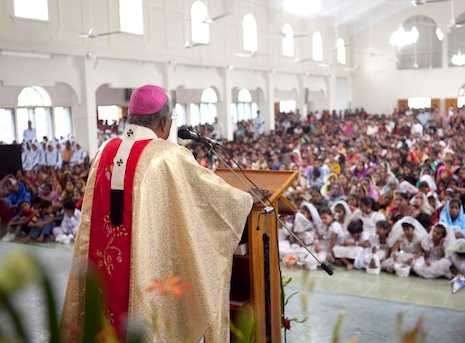
Whether at home in Dhaka or abroad, I attend Holy Mass every Sunday unless sickness or an urgent duty requires my attention.
My fidelity to Mass is not a response to any Church mandate. I would not call myself a traditional or a particularly devout Catholic.
For me, it is a spontaneous inner call to spend an hour or so with God and listen to His words, to rejoice over the good things in my life, to find solace for earthly pain and to receive encouragement to face future challenges.
Too often, however, I find myself in a miserable situation – as many others in the pews next to me do – because priests continue to fail in their duties as preachers to deliver an inspiring and thoughtful homily.
There is growing discontent among Bangladeshi Catholics over the quality of the preaching during Mass, which as a result has become a burden rather than a joy to attend.
Homilies these days comprise either well-worn retellings of the Gospels or the random thoughts of a particular priest. This is not simply unprofessional but also a failure in one of the signal duties of a shepherd of the Church.
They fail to imitate Jesus’ duty to the poor, hungry and worn-out crowds who followed him from the mountains to the sea to hear his words. Our priests run out of fuel while trying to offer spiritual nourishment to those in such desperate need of it.
I feel badly for myself, but worse for others, who take great pains to carve time out of their day for Mass before or after office hours, and on Sunday – a workday in Muslim-majority Bangladesh.
Priests should use their homilies as a tool to explain the Gospels to the congregation in a way that is precise and specific. Parishioners are not abstractions. They are flesh-and-blood people with real joys and sorrows, and they seek honest answers to serious questions that have dogged believers of every age.
Why do bad things happen to good people? Why does evil seem to hold the upper hand over good?
If a doctor fails to prescribe the proper medication or treatment for a patient, his reputation will suffer, patients will go elsewhere and he may even face legal consequences.
This is not the case with priests, of course.
Most Catholics remain devoted and hopeful that things will improve. They continue to endure banal preaching but make no effort to confront the issue by demanding better nourishment.
Over the many years that I have attended Mass, I have discovered two principal causes for bad preaching.
First, many priests seem to feel that what they were taught decades ago in seminary should still suffice. They remain ignorant either to significant developments in theology and homiletics, or to the changes and challenges of modern life.
Second, they seem to spend much more time examining their own needs, experiences or concerns, and then projecting them onto their audience – in effect, telling their parishioners what they should be concerned about rather than equipping them with Gospel-based guidance on real-life challenges.
Our priests need to come down from their ivory towers and get a good look at life as it is lived in the back streets, markets and humble homes of the People of God.
They should be inquisitive about the lives, joys and sorrows of the people God has put in their care. They should be curious about the world and eager to explain in compelling ways how the Gospel remains sufficient for every crisis in an age of multiplying crises. They should be eager to help their flocks find the answers to increasingly complex questions.
I am not arguing that all priests must rise to the rhetorical level of such noted orators as US President Barack Obama, but they should at least employ the humility and love of St John Marie Vianney, the patron saint of parish priests.
Our priests are mediators between God and His people. Their role is to communicate the wonder and joy of faith and the deep love between God and his creation.
So they should be ever mindful of the great responsibility of this office and remember that Mass is not a moribund ritual. It is the feeding of a hungry flock that is desperate for real, substantial and informed guidance.


